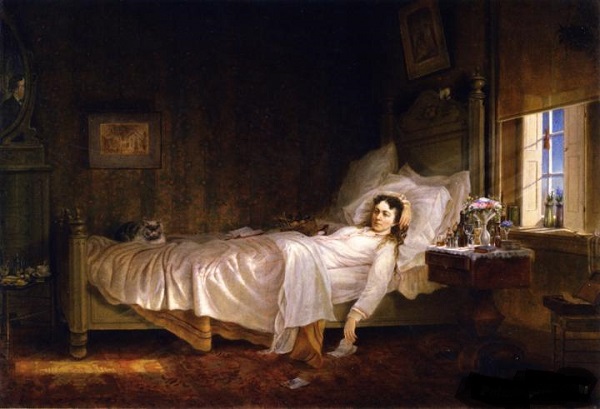FWP:
SETS == CATCH-22
Some manuscripts, and some modern divans, have mu;Nh par raunaq instead of raunaq mu;Nh par ; as always, I follow Arshi. See his discussion in his introduction, p. 123.
As Bekhud Dihlavi observes, the lover is in a kind of catch-22 situation: being separated from the beloved makes him (mortally?) ill, but when she then comes to his bedside, her presence so cheers him that he looks well, and she promptly leaves him again. Her absence makes him ill-- but she can never know this, because her presence instantly makes him seem well again.
Since the surrounding circumstances are left entirely vague, there are several possibilities:
=The lover is in fact mortally ill, but when the beloved comes in, his face brightens so much that she thinks he's in fine shape-- but she's wrong, he's really done for.
=The lover was sick before, but when she comes in, he at once recovers; she rightly judges the improvement in his condition.
=The lover is only 'sick with passion', not physically ill, and the term 'sick person' is used teasingly or sarcastically-- for whenever the beloved glances at him, he looks fine.
The beloved comes in and makes a sort of snap judgment about his condition-- is that because she's casual and basically indifferent, and can't be bothered to investigate more closely? Is this her only visit, or does the verse report on something that happens time after time? Does she know, or care to discover, anything further about his welfare than the glow on his face? Is the glow on his face perhaps all that's really significant about him? All these questions are left for us to contemplate; nothing in the verse gives us the slightest clue.
Note for grammar fans: Nowadays dekhe se would of course be replaced by dekhne se . To me it looks as if the form should be short for dekhe hu))e se , 'from being in a state of having seen', a postposition attached to an adverbial perfect participle. Similarly, hote tak in {78} attaches a postposition to what looks to me intuitively like the adverbial present participle. However, my intuitions in both cases are wrong. Our resident linguist, Peter Hook, comments: 'The example seems to be one of an alternate form of the infinitive followed (as is normal for infinitives) by a postposition. Most NIA [New Indo-Aryan] languages are more flexible than Hindi-Urdu in their use of postpositions with infinitives, and some (Gujarati, Shina) even allow a postposition to govern an entire finite clause.' The moral is, dear reader, that if you're serious about understanding archaic grammatical forms, you need a linguist, not just a notion based on similarity of modern form.
Compare Mir's explanation for the transient flush on the wretched lover's face: M{1058,7}.

Nazm:
The excellence of this verse is manifest in its own right; no other words can go beyond it. (125)
== Nazm page 195